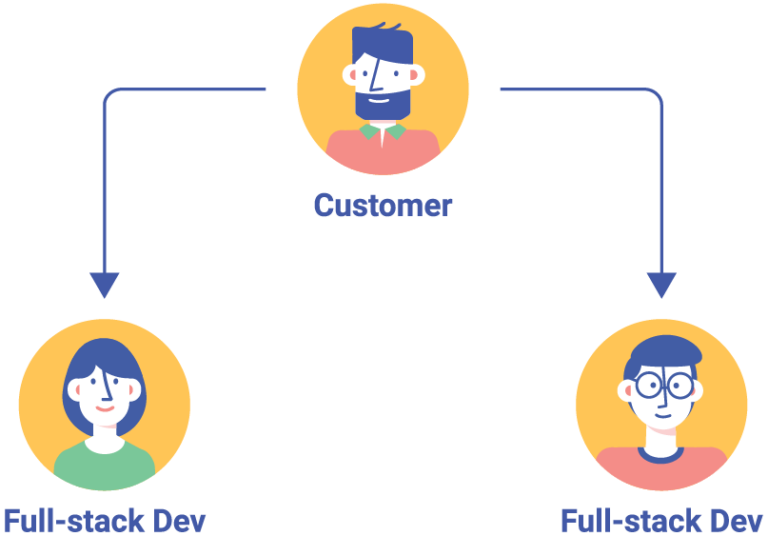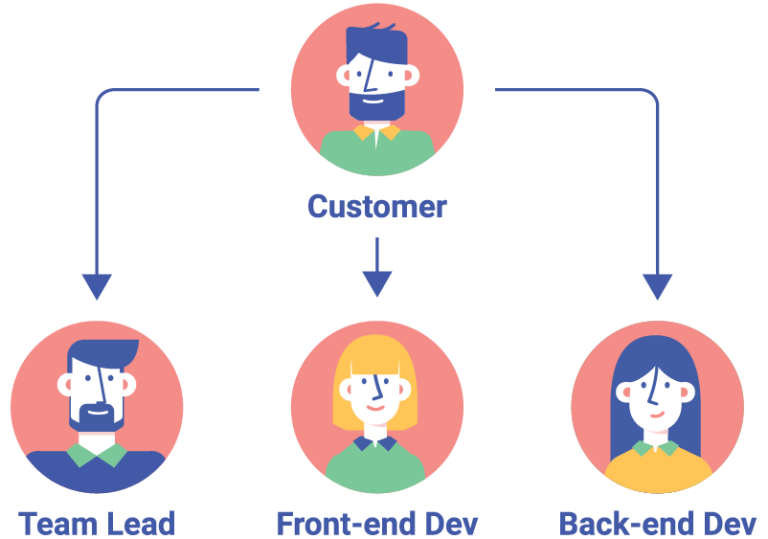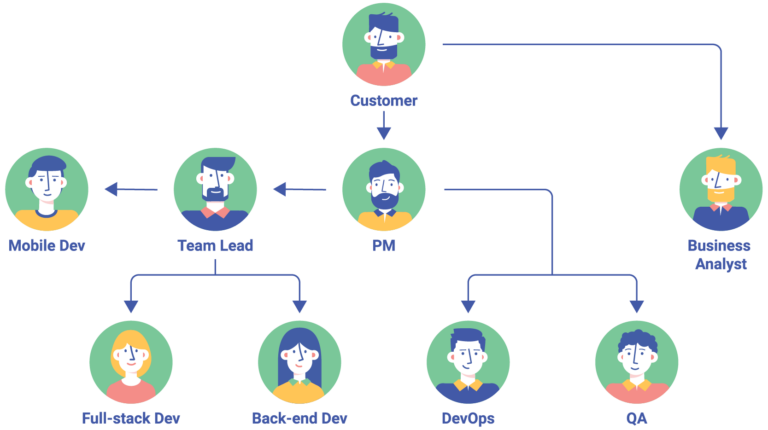What is a Dedicated Software Development Team?
Dedication is about attitude and commitment. While working with an external service provider on software development, customers may face several models of cooperation and interaction. Teams may also work with different levels of independence. Some of these models assume that a client is simply provided with extra resources — developers — and it’s up to the client to organise their work, establish a process, and manage their day-to-day activities. Other models are more self-sustained, the teams act more independently, and all that’s expected from the client is providing the scope of work and setting the priorities.
But the dedicated team approach is not just about independence; it’s about the team’s commitment and dedication to the project’s success. The members of a dedicated team care about their client’s final objectives; they do their best to understand the project’s business domain, the environment in which the final solution will operate, and the end user’s motivation and intentions. They make suggestions and actively contribute to ideas rather than focusing entirely on task execution (frequently ignoring the context and bigger view) — no wonder a dedicated team approach often results in long-term collaborations lasting for years.

Dedicated Development Team: Pros and Cons
This approach is not universally applicable. On smaller projects or in set-ups where external resources augment the in-house team, the team collaboration mechanics are slightly different. Things become more about outstaffing.
On bigger projects, where the entire project or a substantial part can be delegated to a service provider, there is more potential for the team’s autonomy; hence, having a dedicated team could be both beneficial and economically efficient.
With their dedicated team offering, service providers offer the following benefits:
Pros
The entire team is at your fingertips
Short lead time
Access to a large talent pool
No need for recruitment — the entire dedicated software team is formed and available
Different payment structure: no salary and related tax payments
Fewer efforts are needed to train employees
Team mechanics and processes are running smoothly
The shortest lead time possible — the work can begin from day one
There are also certain trade-offs:
Cons
Depending on the provider, it can be difficult to alter the established processes to which the team became accustomed
Problems with communication are possible (caused by differences in language, culture, and mindset)
Time difference may become an inconvenience
Knowledge transfer is required to retain the expertise
Reliance on one provider presents a business risk, which a service provider should mitigate
When is a Dedicated Team Model a Good Choice?
Some ideal scenarios where a dedicated team model is a perfect fit are as follows:
A business with its own in-house team is looking to increase its development capacity. The in-house team usually struggles to address all the priorities. Another team is brought in to “offload” part of the workload to keep it focused on the areas where it’s most efficient, such as roadmap development and support. Both teams work independently, synchronising their efforts occasionally (either directly or via management’s guidance).
Founders of an early-stage startup look for technology partners (if their core expertise is mostly business domain-specific) or capable resources (if they possess technical expertise as well) to bring their ideas to life. Rather than trying to scout individual specialists, it could be reasonable to onboard an established team led by a service provider.
Well-established startups facing expansion or pivot challenges also fall into this group, as they often operate in a fast-moving market environment and don’t have time to cherry-pick extra resources.
The key point here: if you have ongoing development plans, it makes sense to think in terms of a dedicated team and not a project for outsourcing. It does not mean, though, that a dedicated team cannot operate on a project-by-project basis for your business.
Roles and Responsibilities: Members of a Dedicated Team
Depending on your business size, needs, and budget, a dedicated software development team may only include a handful of engineers or can be as big as a small IT company.

The required talent’s selection criteria also depend on the type of software you [need to] create. For web-based solutions, it is common to have:

Mobile or desktop software will require respective types of engineers.
This is pretty much the core of any dedicated team. Development specialists will be engaged full-time, while QA specialists may often be only involved part-time.
It makes sense to consider having a part-time DevOps engineer on your team to take care of the infrastructure and cover the main information security aspects.
Some providers may also offer business analysts, project and even product managers. Usually, the higher levels of the development process that can be covered require a higher level of proficiency from the service provider.

How to Work with a Dedicated Software Development Team Effectively
This question often comes with another one — how do you manage a dedicated team? As we can see from the previous paragraphs, these teams come in different shapes and sizes, so the business approach to dealing with them will be different. There are some generally applicable rules, though.
Define the responsibility levels.
What you want to avoid at all costs is having to micromanage your team. Because then you don’t receive all the benefits of this model. Instead, set clear expectations from the top of your team pyramid (a project manager, a team lead, etc.) and articulate them. Let the team be autonomous, but make sure its working process is transparent to you. You want to avoid a so-called “submarine tactic” — when the team disappears from the radar for a long time and then re-surfaces in some unexpected place.
Keep the priorities clear.
Provide a bigger context and share your objectives and priorities. This will help the team to streamline their activities to achieve your goals more effectively. A so-called “tunnel vision” operation mode, when a team cannot see the forest behind the trees, is definitely going to be counterproductive. If things change — i.e. you have an event coming up or a new client onboarding — share that with the team. You and your business are leading the way, so if you want everyone to catch up with you, make sure you tell your “followers” how the path ahead is changing.
Keep your comm channels open.
Be accessible and approachable to the team so that they can address any important issues or problems with you without hesitation. That way, you’ll have control over the situation, and they’ll feel your support.
Summary
Selecting an optimal dedicated software development team is a strategic process that requires meticulous consideration and informed decision-making. Beyond technical proficiency, success hinges on understanding project intricacies, fostering effective collaboration, and aligning team expertise with unique goals. This journey extends beyond project completion, emphasising a commitment to continuous improvement and adaptability in the ever-evolving technological landscape.
As you navigate team management, cost considerations, and cooperation models, each phase contributes to a strategic approach — an endeavour towards building a dedicated software team that serves as a collaborative partner fostering technological excellence on your journey.



